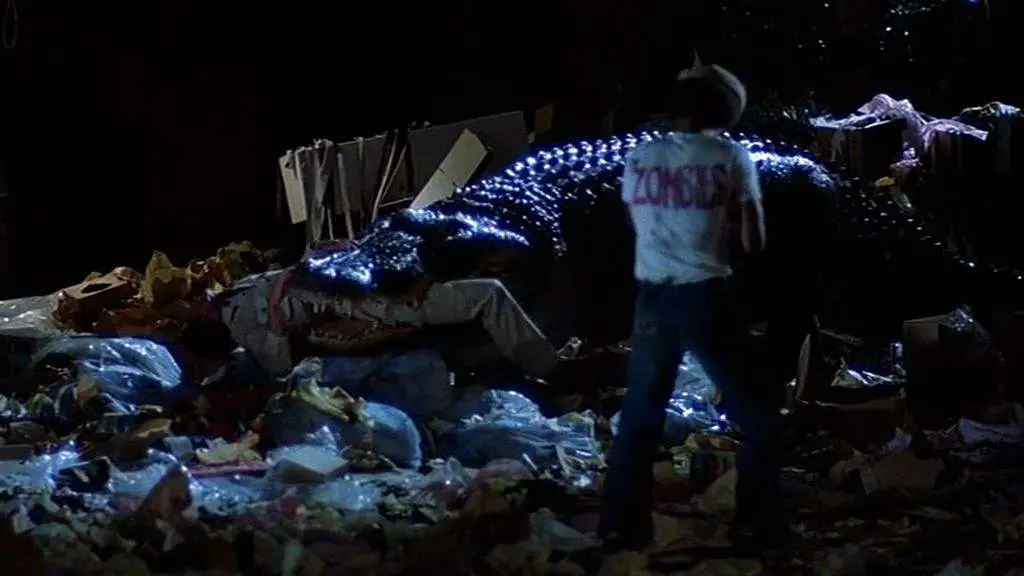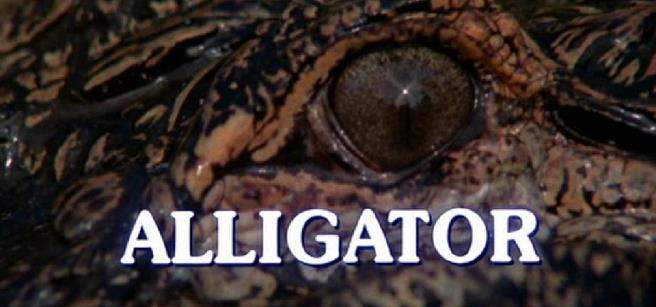Jaws opened up the door for dozens, if not hundreds of imitators. It makes sense when you think about it. Jaws created the blockbuster, after all. It was the first major box office hit of that magnitude and, in a lot of ways, it changed the industry. Everyone wanted to try and recapture that success and the most obvious way was to try and make movies of a similar type hoping that they would share the same fate.
Part of the universal appeal of Jaws is that the monster is not a supernatural or science fiction entity—it’s just a shark. It’s an animal that is powerful and frightening. It led to the “Animal Attack” subgenre that is just as lucrative as ever while naturally kicking off the sharksploitation movement at the same time. Most filmmakers tried to find the next big killer shark while others like Orca tried to find a close enough cousin. Most of them didn’t work. Even the ones that did couldn’t come close to being what Jaws was as a piece of filmmaking.
To make things clear right off the bat: Alligator is no Jaws. But it is a good movie and considering the circumstances of animal attack features at the time, even that is something of a small miracle. It’s a solid and effective movie that doesn’t try to be anything more or less than what it is.
Alligator takes its basic story cues from one of the most prevalent urban legends of the twentieth century: the idea that there are alligators living in the sewers of large cities. It starts off harmless enough, with a little girl buying a baby alligator at a local fair, back when you could do that kind of thing. Although, why she would want it after having just seen someone mauled by one during a gator wrestling show is another matter. It’s at least clear that her character is fascinated by reptiles and that comes into play later.It’s such an obvious idea, this baby alligator that is flushed down the toilet but survives in the sewers. But screenwriter John Sayles, who also wrote The Howling, uses that simplicity to perfect effect. There’s not a ton to the characters, yet they are likable. Our hero is a cop whose greatest character arc is coming to terms with male pattern baldness. It’s not the character work of Jaws by any stretch, yet these people are interesting to watch nonetheless.
Where Alligator really succeeds is in the build up of suspense. This seems like the most obvious thing it would take from Jaws and yet here it simply feels natural. We’re focused on the public paranoia, the media believing that a Jack the Ripper sort of killer is stalking the streets, and we get glimpses of kills but the film holds off on actually showing the alligator for quite a while. It’s really not until it breaks to the surface for its full on rampage that we actually get a good look at it.
 There’s a tonal shift about halfway through the movie that’s great just in terms of how unexpected it is. We go from a somewhat subtle investigative thriller to a pure, unashamed creature feature in the blink of an eye. Both are fun to watch, but where Alligator really succeeds is in the seamlessness of this transition.
There’s a tonal shift about halfway through the movie that’s great just in terms of how unexpected it is. We go from a somewhat subtle investigative thriller to a pure, unashamed creature feature in the blink of an eye. Both are fun to watch, but where Alligator really succeeds is in the seamlessness of this transition.
Alligator fully embraces its destiny as a post-Jaws monster movie. We get everything from a gator picking off kids in a lake to crashing a wedding. This is the kind of film that the SyFy Channel is constantly trying and failing to emulate. It has some surprisingly great FX for 1980, combining a real alligator on slightly smaller sets with various puppetry and animatronic work. The most haunting images, though, are the recurring shots of the alligator’s eyes, just a glistening hint of blue and yellow in the darkness.
At the same time, Alligator is somewhat elevated by at least having something—even a small something—to say. The creature grows to such enormous size by feeding on genetically modified test subjects; dogs and cats, mostly. Whatever chemicals were being fed to these animals were, in turn, being fed to the alligator, acting as a growth hormone and that’s how it gets to be so massive. Genetic modification was just starting to be an issue in the early 1980’s and has only grown as such since. In this way if no other, Alligator is somewhat ahead of its time.
 There’s talent behind Alligator that makes it a better movie than it would have been otherwise. Everyone involved knows exactly what they’re doing. Robert Forster feels genuine, almost like he should be a lead in a cop movie and just happens to be in a horror film. Lewis Teague is an underrated director who went on to find greater mainstream success just a few years later with an adaptation of Stephen King’s Cujo. John Sayles was no stranger to this type of horror film, having previously scripted Joe Dante’s Piranha. He would go on to work with Dante again just after this, writing the screenplay for The Howling.
There’s talent behind Alligator that makes it a better movie than it would have been otherwise. Everyone involved knows exactly what they’re doing. Robert Forster feels genuine, almost like he should be a lead in a cop movie and just happens to be in a horror film. Lewis Teague is an underrated director who went on to find greater mainstream success just a few years later with an adaptation of Stephen King’s Cujo. John Sayles was no stranger to this type of horror film, having previously scripted Joe Dante’s Piranha. He would go on to work with Dante again just after this, writing the screenplay for The Howling.
Looking at the people involved, it’s no wonder that Alligator wound up being such an interesting and tightly made creature feature. It may not be much more than your standard monster movie, but it’s not trying to be.








